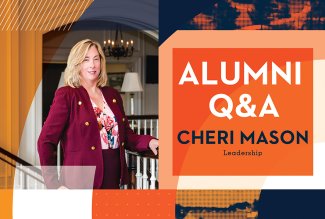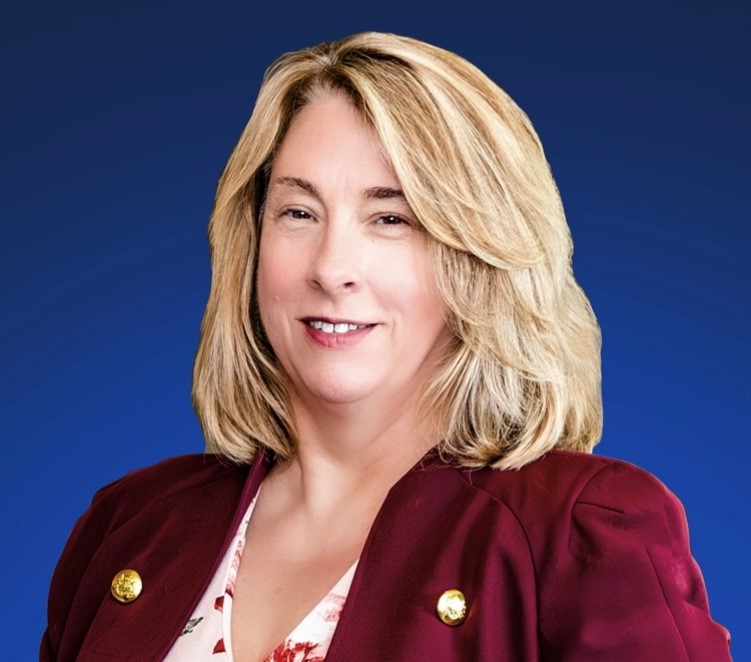
The Honorable Cheryl “Cheri” Mason, BA ’86, JD, is a foremost expert on unconventional leadership—the kind centered on genuine relationships.
She gained extensive insight into leadership throughout her 30-plus year career of dedicated federal service, and through her experiences as a military spouse. Her husband, Lieutenant Colonel (USAF ret.) Brett Stuart Mason, BSEE ’86, is also an ONU graduate.
Most recently, Mason served as the fourth Presidentially appointed, Senate-confirmed, and the first woman and military spouse chairman of the Board of Veterans’ Appeals at the U.S. Department of Veterans Affairs, from 2017-2022.
In this role, she led a team of over 1,200 personnel, including veterans law judges, attorneys, and operations and administrative professionals; advised the VA Secretary; and executed a $228 million independent budget to meet the board’s mission of conducting hearings and deciding appeals on benefits and services for veterans and their families.
Widely recognized for her successful tenure, her accomplishments included implementing technological innovations, streamlining processes, championing personnel development, and improving operations by establishing consistency in management and hiring practices. By empowering her team, she increased access and improved outcomes for veterans and their families. In fact, in less than five years she nearly doubled the number of hearings and decisions issued.
Upon retirement from the federal government, Mason felt compelled to write a book sharing her leadership wisdom. “Dare to Relate: Leading with a Fierce Heart,” coming out this spring, is about “facing adversity and carving your own path. It is about what we learn and what can happen on our journey when we relate and engage with people,” she says.
In talking with hundreds of individuals in many different industries over the past several years, Mason says she has noticed a widening gap between leaders and employees.
 “Leaders must learn soft skills; and, interpersonal skills of care, support, and relating to their employees as people with whole lives,” she said. “As technology continues to advance, people need interaction and connection to know they matter and that they are seen, heard, and valued. Conventional leadership does not teach these skills.”
“Leaders must learn soft skills; and, interpersonal skills of care, support, and relating to their employees as people with whole lives,” she said. “As technology continues to advance, people need interaction and connection to know they matter and that they are seen, heard, and valued. Conventional leadership does not teach these skills.”
In a Q&A, Mason, who is now a strategic executive, motivational speaker, and thought leader, offered her insights on leadership in today’s complex landscape.
Q: What inspired you to write your book on leadership?
A: I wanted to challenge the status quo with leaders and encourage aspiring leaders not to accept conventional leadership.
Q: What are some key takeaways you hope readers glean from your book?
A: One takeaway I hope people see is that it is not necessary to follow a particular path or leadership ladder to be successful; your path can have ups, downs, and lateral moves.
Another takeaway is that obstacles are only barriers if you accept them as such; they can be catalysts that propel you forward to help you discover your purpose.
Finally, people are a leader’s most valuable assets and should always be treated as people first. Leadership is not about you, the leader; leadership is all about the people you lead and how you care for and support them.
Q: What do you see as the most significant challenges facing leaders today, and how can they prepare to face these challenges proactively and effectively?
A: The most significant challenge facing leaders today is that people have choices, and they are redefining what personal and professional success looks like. Life is more than work. Work is part of life, but should not dominate it.
People want to have impact and purpose and bring value—to know they matter to the leader and the organization. If you treat people like they are replaceable, they will act like they are replaceable.
If leaders don’t learn to relate to people, both the leaders and the organization will be impacted by issues of recruitment, retention, and declining outcomes.
Leaders have to step forward and be visible and approachable—they can’t hide behind busyness or in ivory towers and delegate these responsibilities to others. The workforce and customers of today and tomorrow expect to see leaders—to show that they are human beings.
Q: What do you believe are the three greatest traits for any leader to possess?
A: Everyone has different traits and gifts, how they are used is key. In the book, I talk about those, but I also talk about essential tools. I believe there are five essential tools: self-awareness; agility; resilience; vulnerability; and courage. If I had to pick three: self-awareness, vulnerability, and courage—all require the leader to stop focusing on themselves and show themselves to others.
Q: What is the greatest lesson you learned as a leader, and how did it change you?
A: Never let anyone try to put you in a box or give you a cloak of invisibility. I learned to look behind actions and ask “why?” I learned to embrace my gifts and strengths, even if they challenged others.
Q: What are the biggest mistakes/miscalculations that you see leaders make time and again, and how can they avoid them?
A: Mistakes, miscalculations, and failures are a part of leading. You will make them. And, you will be better because of them. Time and again, however, I see leaders struggling with imposter syndrome: the belief that their leadership position isn’t deserved. Learning to manage imposter syndrome and the gremlins that come with it is key to becoming a good leader. Don’t let it own you, because people/employees will not follow leaders with imposter syndrome because they know the leader won’t fight for or protect them.
Q: What advice do you have for emerging leaders, or those just starting out who aspire to leadership positions?
A: As I state in my book, you can’t lead until you know who you are. Read, listen, learn, make mistakes, take chances, and most of all, value and relate to others.